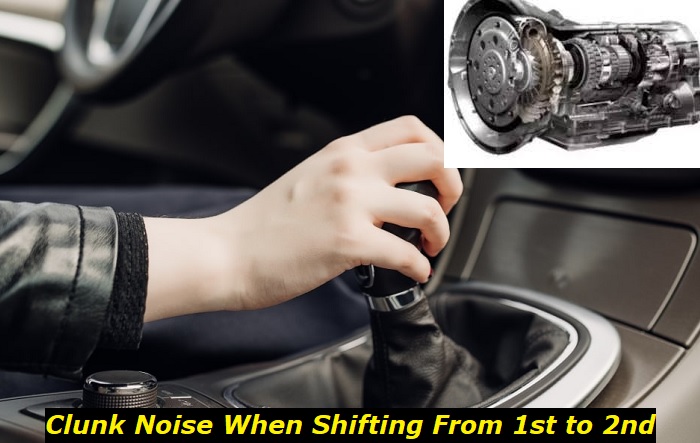Cars make different noises when doing different things. We're used to the growl of the engine when you step on the gas, or the squeal of tires when you brake hard. Sometimes your car makes a sound that just isn't right. Like when you hear a jarring clunk after shifting gears from 1st to 2nd. What sort of problem could be causing this sound, and what does it mean for your car?
Noises when shifting from 1st to 2nd gear highlights
- Level of importance:Medium
- Reasons:Issues with fluid, electronic control problems, hardware problems
- Needed expertise:High
- Needed tools:Professional tools set
- Time taken:1-10 hours
- Can you drive? Carefully
- Possible issues: Fatal damage, issues with torque converter, inconvenient driving.

Why Does Your Car Clunk When You Change Gears?
A good transmission should shift smoothly, with minimal resistance and noise. If you find that your transmission is making a noise between certain gears, such as the first and second, then you might worry that something is wrong with it.
A clunk when shifting gears doesn't always indicate a serious problem. However, it's worth figuring out the source of the noise to eliminate the sound, as well as any potential risk of future problems.
Here are the common causes of a clunking noise when shifting from 1st to 2nd gear.
1) Old or Low Transmission Fluid
Whenever you notice any odd behavior from your car's transmission, the first place you should look is your transmission fluid. Transmission fluid acts like a lubricant to your car's transmission. It also helps some of the transmission components transfer power through hydraulic pressure. Without transmission fluid, the transmission system will operate weakly and break down.
Transmission fluid also needs to be replaced regularly, as it degrades with time and starts to build up dirt and debris. Old transmission fluid is less effective, which can cause the surfaces in the system to wear down.
Symptoms of Bad or Low Transmission Fluid
If the transmission fluid is bad, or the fluid level is too low, then the transmission won't work smoothly. This can result in the following symptoms:
- Hard shifting
- Clunking noises when shifting
- Jerking motions when shifting
- Slipping gears
- Burning smell
- Poor acceleration
You can check the state of your transmission fluid using the transmission dipstick. If the fluid is below the minimum level, you will need to top it up until it is between the minimum and maximum levels.
You should also check the color of your transmission fluid. Good transmission fluid is red or pink. Dirty or degraded transmission fluid will appear as a darker red, brown, or even black.
If the transmission fluid is low, it will need to be topped up. Degraded transmission fluid will need to be replaced. This will allow the transmission to function effectively again and will prevent further damage.
2) Rev Hang
Rev hang is a phenomenon that occurs in modern cars that use an electronic throttle control system. When shifting gears in a car that suffers from rev hang, it is very common to hear clunking from the transmission. This isn't the result of a problem with the engine or transmission, but rather a design choice from the manufacturer.
Normally, when the clutch is engaged and the accelerator is released, the engine speed should drop. After shifting gears and releasing the clutch, the engine speed will climb again to match the transmission speed.
Rev hang occurs when the engine speed doesn't start to decrease immediately, but instead drops very slowly, almost as if it was "hanging" at its original speed. If the gear is shifted before the RPM has dropped to a reasonable level, it can cause a clunking noise, or even a jerk, as the engine and the transmission are recoupled and forced to move at the same speed.
In most transmissions, the gear difference between 1st and 2nd is large, making the effects of rev hang more noticeable than when shifting between other gears, such as 2nd and 3rd.
Why Are You Experiencing Rev Hang?
Rev hang isn't a problem with your car. In fact, it's a feature designed into the operation of your engine.
Rev hang was introduced by manufacturers as a way to reduce the emissions the engine creates during gear changes. If your car has rev hang, then the ECU is delaying the closing of the throttle to allow all of the fuel remaining in the intake manifold to burn off. This reduces emissions.
While the good news is that there's nothing wrong with your car, the bad news is that you can't get rid of rev hang.
How Do You Get Around Rev Hang to Avoid Clunking?
Rev hang is an annoying issue because it makes shifting a bit less smooth, and can cause that nasty clunking noise. However, it won't damage your transmission, and can safely be ignored.
If you prefer not to deal with the clunking, however, you can learn to shift in a way that accommodates the rev hang and eliminates the sound.
To prevent clunking from happening when shifting in a car with rev hang, you will need to wait for the engine RPMs to start dropping before shifting. This means you'll need to pay attention to the tachometer needle to determine the right point to shift. Once you've done this a few times, you'll get a sense of the proper timing and know when to shift on time to avoid the clunking noise.
3) Bad Engine Mounts
Engine mounts, or motor mounts, are an often overlooked part of a car that serves a very important role. They hold the engine in place and dampen its vibrations to prevent the engine and transmission from rattling around in the frame. This also keeps the frame from vibrating, protecting the cabin and its occupants from being shaken around.
If the engine mounts are damaged or worn, the engine will start to vibrate freely inside the engine bay. This can cause problems with the transmission as the engine's vibrations jostle it, compromising the precise clearances and alignments between the gears and other parts of the transmission. This can cause clunking noises when shifting gears, as the transmission has trouble shifting smoothly due to the engine's movements.
How Do You Know if You Have Bad Engine Mounts?
Some symptoms of worn or damaged motor mounts are:
- Increased vibrations of the engine and the car in general.
- A clunking noise and/or jolting when shifting gears.
- Banging or thumping sounds from the engine compartment.
- Lurching when starting the car.
Bad engine mounts will need to be replaced to eliminate the symptoms and clunking noise from your transmission.
What Will Happen if You Don't Change Your Engine Mounts?
Bad engine mounts need to be changed as soon as possible. Leaving worn engine mounts in your car can cause further problems to develop.
- Engine damage: This can happen as a result of the movement or misalignment of the engine.
- Damage to other parts of the car: The movement and misalignment of the engine can cause damage to other parts, either through misalignment, stretching, or wear. This can cause belts and hoses to wear down and break. It can also lead to transmission damage.
4) Worn Transmission
When the transmission is in good condition, it should operate without making much noise, and without jolting the car when shifting. If the transmission is in a poor state, it will have trouble transferring power, and you'll notice some issues with shifting.
Symptoms of Worn Transmission
There are many different parts in a transmission, each with different functions, so you might experience a wide variety of different symptoms if your transmission is worn. However, there are some common symptoms that you might experience. You may have a worn or damaged transmission if you notice one or more of the following:
- Difficulty shifting
- Clunking or grinding noises when shifting
- Slipping gears
- Loss of power and sluggish acceleration
If you suspect that your transmission is worn or damaged, you should have your car inspected by a professional mechanic as soon as possible. A damaged transmission will only get worse if it is ignored, leading to costlier repairs. This could eventually lead to complete transmission failure, which is even more expensive to repair.
Conclusion
Experiencing clunking when you shift gears from 1st to 2nd can be somewhat scary, especially if it makes you suspect a problem with your car's transmission. Fortunately, this occurrence doesn't always indicate impending doom for your transmission. In most situations, the issue is caused by rev hang or a lack of clean transmission fluid.
Bad motor mounts or a worn transmission are other possible causes, both of which can result in serious damage to your car and transmission system if ignored. These problems will require some repairs to be done to your car.
About the authors
The CarAraC research team is composed of seasoned auto mechanics and automotive industry professionals, including individuals with advanced degrees and certifications in their field. Our team members boast prestigious credentials, reflecting their extensive knowledge and skills. These qualifications include: IMI: Institute of the Motor Industry, ASE-Certified Master Automobile Technicians; Coventry University, Graduate of MA in Automotive Journalism; Politecnico di Torino, Italy, MS Automotive Engineering; Ss. Cyril and Methodius University in Skopje, Mechanical University in Skopje; TOC Automotive College; DHA Suffa University, Department of Mechanical Engineering






Add comment